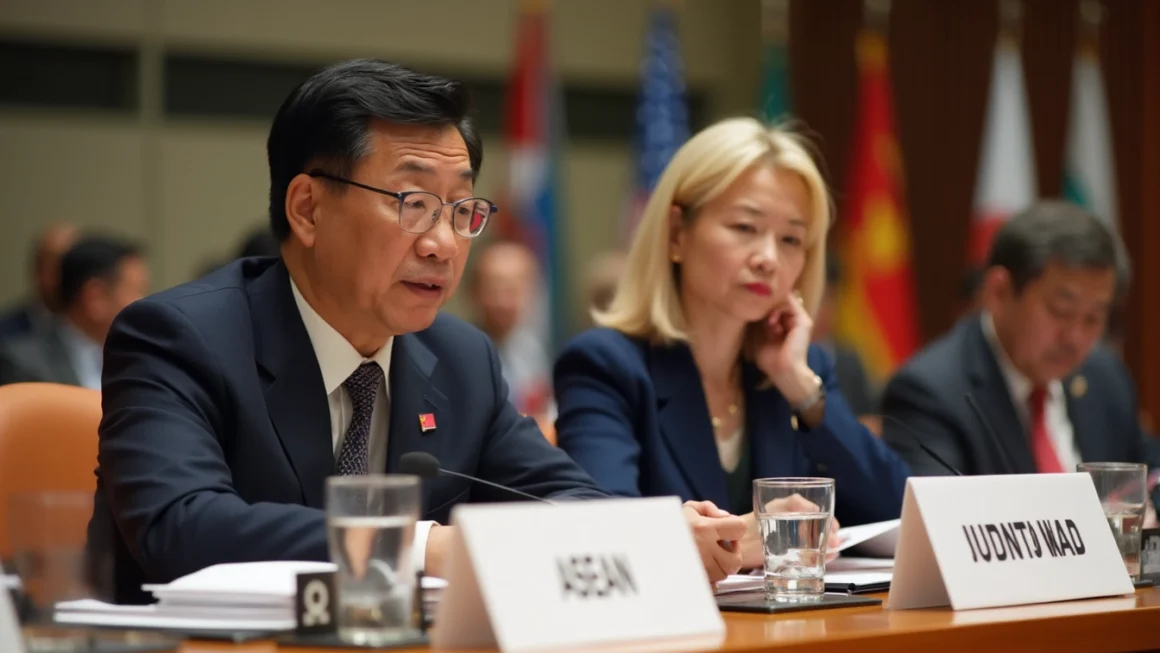In a recent development that has caught the attention of international observers, China has declined an invitation from the United States to participate in a high-level defense meeting. This decision comes amidst growing tensions between the two global powers and raises questions about the future of diplomatic relations in the Asia-Pacific region.
The Invitation and Its Context
Table of Contents
The invitation in question was extended for the ASEAN Defense Ministers’ Meeting-Plus (ADMM-Plus), a significant forum for defense diplomacy in Southeast Asia. This year’s meeting, hosted by Laos, marks an important gathering of defense leaders from the Association of Southeast Asian Nations (ASEAN) and its dialogue partners.
The ADMM-Plus has historically been a platform for promoting regional peace and stability, fostering practical cooperation among the armed forces of participating countries. It typically includes discussions on various security challenges and opportunities for collaborative defense initiatives.
China’s Decision and Its Implications
China’s decision to decline the U.S. invitation is noteworthy for several reasons:
- It signals a potential shift in China’s approach to regional defense diplomacy.
- It may reflect the ongoing tensions between China and the United States on various fronts, including trade, technology, and geopolitical influence.
- The move could impact the dynamics of the ADMM-Plus meeting and broader regional security discussions.
Experts suggest that this decision might be part of China’s broader strategy to assert its influence in the region while challenging U.S. involvement in Asian affairs.
Regional Reactions and Potential Consequences
The reaction from other ASEAN members and dialogue partners to China’s decision is likely to be mixed. Some countries may view this as an opportunity to strengthen their own relationships with China, while others might be concerned about the potential implications for regional stability and cooperation.
This development could lead to several outcomes:
- Increased diplomatic efforts by both the U.S. and China to engage with ASEAN nations individually.
- A possible recalibration of regional defense cooperation frameworks.
- Greater emphasis on bilateral defense agreements as opposed to multilateral forums.
The Role of ASEAN in Regional Diplomacy
ASEAN’s position in this scenario is crucial. As the central organization in Southeast Asian diplomacy, ASEAN has long maintained a policy of neutrality and inclusivity. The group’s response to this development will be closely watched by international observers.
ASEAN’s challenge will be to maintain its unity and centrality in regional affairs while navigating the complex dynamics between major powers. The organization may need to employ innovative diplomatic strategies to ensure that all key players remain engaged in regional security dialogues.
The Broader Context of U.S.-China Relations
This incident is part of a larger pattern of evolving U.S.-China relations. Recent years have seen increased competition and tension between the two nations across various domains, including:
- Economic and trade disputes
- Technological rivalry, particularly in areas like 5G and artificial intelligence
- Geopolitical competition, especially in the South China Sea
- Disagreements over human rights and political systems
The decline of this invitation adds another layer to this complex relationship, potentially influencing future diplomatic and military engagements in the region.
Looking Ahead: Implications for Regional Security
As the situation unfolds, several key questions emerge:
- How will this decision impact future defense cooperation in Southeast Asia?
- What strategies will the U.S. and other regional players adopt to maintain engagement with China on security issues?
- How might this affect ASEAN’s role as a mediator in regional affairs?
The answers to these questions will likely shape the landscape of Asian security dynamics in the coming years. It’s clear that diplomatic creativity and flexibility will be essential in navigating these challenging waters.
The Importance of Continued Dialogue
Despite the current challenges, the importance of continued dialogue and cooperation cannot be overstated. Regional stability and security are best served when all major players are engaged in constructive discussions. Automated diplomatic channels and innovative communication platforms could play a crucial role in maintaining open lines of communication, even in times of tension.
As the situation develops, it will be crucial for all parties to remain open to dialogue and seek common ground. The complex nature of modern global challenges requires collaborative approaches, even amidst disagreements.
Conclusion
China’s decision to decline the U.S. invitation to the ADMM-Plus meeting is a significant development in the ever-evolving landscape of Asian geopolitics. It underscores the ongoing challenges in U.S.-China relations and highlights the delicate balance that ASEAN and other regional players must maintain.
As the international community watches these developments unfold, the focus will be on how regional stability can be maintained, how dialogue can be fostered, and how the interests of all parties can be addressed in a constructive manner. The coming months will be crucial in determining the trajectory of regional security cooperation and the broader dynamics of international relations in Asia.




